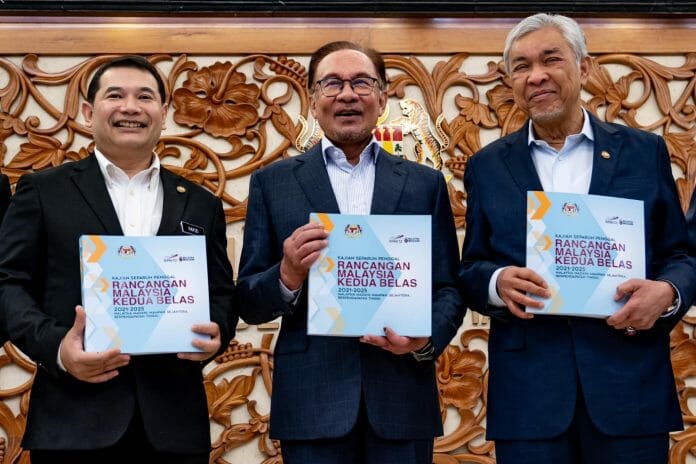The Twelfth Malaysia Plan, 2021-2025 (Twelfth Plan), is a medium-term plan with the objective of achieving ‘A Prosperous, Inclusive, Sustainable Malaysia’.
The Mid-Term Review (MTR) of the Twelfth Plan, 2023-2025, announced by Prime Minister Datuk Seri Anwar Ibrahim today (Sept 11) encompasses revised policies and strategies towards achieving the aspiration of ‘Ekonomi MADANI: Memperkasa Rakyat’ that will regain honour and dignity of the rakyat as well as building Malaysia as an advanced and prosperous nation.
The MTR of the Twelfth Plan is based on the theme ‘Sustainable, Prosperous, High-Income Nation’. Enhancing efficiency of public service delivery is the key enabler that will accelerate the implementation of three main focus areas, namely strengthening sustainability, building a prosperous society and achieving a high-income nation.
A total of 17 Big Bolds are introduced as catalytic strategies in accelerating the move towards achieving the targeted outcomes. The ultimate goal of the MTR of the Twelfth Plan is to ensure that no one is left behind from reaping the benefits of socioeconomic development and have equal access to opportunity in increasing the standard of living as well as in providing a bright future for generations to come, regardless of ethnicity, location, gender and socioeconomic background.
The Twelfth Plan was anchored on the implementation of three key themes, namely resetting the economy, strengthening security, wellbeing and inclusivity as well as advancing sustainability. Four catalytic policy enablers, namely developing future talent, accelerating technology adoption and innovation, enhancing connectivity and transport infrastructure as well as strengthening the public service supported the implementation of these themes.
Theme 1: Resetting the Economy
The theme on resetting the economy focused on restoring the growth momentum and propelling the growth of strategic and high impact industries as well as micro, small, and medium enterprises (MSMEs). Efforts were undertaken to rejuvenate the economy by boosting productivity growth, expanding export markets, strengthening the effectiveness of financial intermediation ecosystem, enhancing the role of industrial estates and food production areas as well as improving governance and policy. In boosting productivity growth, focus was given to, among others, strengthening the planning, evaluation and monitoring mechanisms as well as scaling up green practices.
Meanwhile, measures to enhance the contribution of eight strategic and high impact industries as well as boost capabilities of entrepreneurs and enterprises were undertaken. Strategies implemented to accelerate the development of strategic and high impact industries include boosting E&E industry in moving up the value chain, reenergising the tourism industry and intensifying smart farming activities.
Additionally, strategies to boost entrepreneurs and MSMEs capacities and capabilities were implemented by creating innovative and sustainable entrepreneurs as well as a conducive and holistic entrepreneurial ecosystem. A total of 38 targets were set under the theme, with 15 of the targets were achieved, 20 are on track, while the remaining three are lagging.
Measures to strengthen economic sectors affected by COVID-19 pandemic have succeeded in several areas during the review period. These include improvement in productivity growth of the manufacturing sector at 5.4% per annum, and services sector at 3.6% as well as higher exports in manufacturing sector at RM1,304.7 billion in 2022, mining sector at RM117.3 billion, agriculture sector at RM120.9 billion and construction sector at RM6.1 billion.
In addition, for strategic and high impact industries, export value of E&E products reached RM593 billion in 2022, average growth of domestic visitors increased by 10.8% per annum, while exports of halal products registered a value of RM59 billion in 2022. Meanwhile, digitalisation rate among MSMEs reached 98.1%.
Theme 2: Strengthening Security, Wellbeing and Inclusivity
Theme 2 focused on strengthening security, wellbeing and inclusivity. In ensuring national security and sovereignty, measures were undertaken towards providing a conducive environment for economic activities and safe living as well as ensuring a dignified and resilient nation. The main strategies include safeguarding national sovereignty and intensifying efforts in crime prevention, rehabilitation and emergency preparedness as well as improving the welfare of personnel.
Theme 3: Advancing green growth, enhancing energy sustainability
In implementing a low carbon, clean and resilient development, among the strategies were strengthening actions towards a low carbon nation, accelerating circular economy and encouraging sharing of responsibility in pollution prevention.
Meanwhile, in managing natural resources efficiently, measures undertaken include conserving the ecosystems and enhancing conservation of water resources. Efforts on strengthening the enabling environment were also emphasised through scaling-up green financing and promoting green investments as well as instilling sense of ownership and shared responsibility.
A total of nine targets were set in advancing green growth. One of the targets was achieved, while the remaining five are on track and three are lagging.
The government green procurement for selected green products and services recorded 27.8%, exceeding the 25% target. Despite various efforts undertaken, challenges in addressing climate change and environmental degradation as well as loss of biodiversity and unsustainable use of natural resources continue to persist.
In addition, low implementation of sustainable development goals (SDGs) and low adoption of environmental, social and governance (ESG) as well as ineffective governance remain a challenge.
During the review period, measures were undertaken to enhance energy sustainability for all. Concerted efforts were undertaken in enhancing the energy sector, ensuring sustainable and progressive oil and gas subsector as well as enhancing the electricity subsector.
Five targets were set in ensuring sustainable energy. Two of the targets were achieved, while the remaining three are in progress.
The National Oil & Gas Services and Equipment (OGSE) Industry Blueprint, 2021-2030 was launched in 2021 and the National Energy Policy, 2022-2040 in 2022. However, there are challenges that need to be addressed pertaining to global climate change pressure, lack of integrated plan and strategies in accelerating energy transition, impediments in the oil and gas industry as well as low deployment and adoption of renewable energy (RE).
Priority was given on transforming the water sector to ensure water security. In this regard, focus was given on empowering people, ensuring sustainable financing and developing sustainable infrastructure with costeffective technology. A total of five targets were set in transforming the water sector.
Out of these targets, four are on track while one is lagging. Major obstacles that impeded the transformation of the water sector were lack of collaboration, lack of data driven decision-making, poor governance, weak financial capability as well as ageing and outdated infrastructure.
MTR Main Focus Areas
Three main focus areas outlined in the MTR of the Twelfth Plan are strengthening sustainability, building a prosperous society and achieving high-income nation. Each focus area is complemented with comprehensive strategies and initiatives to address the identified key issues and challenges.
Strengthening Sustainability
The MTR of the Twelfth Plan will continue to focus on strengthening sustainability by boosting economic growth, enhancing fiscal sustainability and accelerating transition towards a future-proof economy. Efforts will be intensified in accelerating structural economic reforms, strengthening external trade in the global value chain, optimising economic potential of regions and states, and managing inflation.
In this regard, measures will be undertaken to strengthen competitiveness and productivity. Priority will be given to accelerate the development of new sources of growth, particularly in high growth high value (HGHV) industries. In addition, focus will be given to attract more quality investment in technology-based industries to spur sectoral growth and create high-paying jobs.
In enhancing fiscal sustainability, emphasis will be given to strengthen fiscal governance, expand revenue base, retarget subsidies and enhance budget management as well as improve debt and liabilities management towards achieving fiscal deficit target between 3.5% and 3% to GDP in 2025.
Fiscal management will be improved by establishing a legislation on fiscal responsibility as well as developing new acts on debt and procurement. In addition, revenue management will be improved by widening the tax base as well as adopting technology and digitalisation to enable better collection.
Efforts will be undertaken to implement Targeted Subsidies as one of the Big Bold in ensuring the right target groups benefit from the assistance provided as well as ensuring prudent fiscal spending. In this regard, PADU will be leveraged as a central reference system for assistance targeting based on household disposable income.
Among the subsidies include electricity, diesel and petrol as well as other social assistances. The energy transition presents significant opportunities for Malaysia to unlock the green growth potential.
This transition include transformation towards HGHV Industry Based on Energy Transition as one of the Big Bolds. In this regard, a national energy transition roadmap will be implemented to accelerate the development of RE sources such as solar, bioenergy and hydrogen.
Meanwhile, an electricity exchange system to enable cross-border RE trading, capitalising on rising regional RE demand, will be created, while the preparation of the regulatory framework for carbon capture, utilisation and storage (CCUS) will be accelerated. In addition, towards achieving aspiration of a net-zero greenhouse gas emissions as early as 2050, a long-term low emissions development strategies (LT-LEDS) will be formulated and a carbon pricing mechanism will be implemented.
Pursuing a just energy transition is an integral part of economic restructuring, employment creation, economic growth and sustainable development. In advancing sustainability, climate change and other environmental challenges will be addressed, including in the energy and water sectors.
In accelerating the implementation of low carbon, clean and resilient development, strategies will be focused on, among others accelerating transition to circular economy and encouraging sharing of responsibility in pollution prevention. In managing natural resources efficiently, emphasis will be given to conserve natural ecosystems as well as strengthen water management. Efforts will be intensified to accelerate SDGs implementation and ESG adoption.
The efforts to build an inclusive and more resilient society will be pursued during the remaining Plan period in building a prosperous society. In addressing and preventing poverty, efforts will be intensified towards increasing income and improving standard of living.
Measures to empower vulnerable households include enlarging economic opportunities and protection, as well as improving access to basic services. The M40 will be further facilitated to increase income and access to housing as well as improve health and employment protection. Improving access to opportunities and strengthening social protection are pivotal in narrowing inequality. Meanwhile, strategies to scale up businesses and increase wealth creation will be intensified to ensure equitable outcome for Bumiputera.
Emphasis will be placed on accelerating socioeconomic development for Orang Asli community. Strategies to empower specific target groups include enhancing wellbeing of children and aged population as well as gender empowerment. Social Protection Reform will be undertaken as one of the Big Bolds to improve efficiency and effectiveness in assisting the poor and vulnerable. This reform will be implemented holistically at the Federal and state levels.
In this regard, social protection system will be strengthened, taking into account different risks and vulnerabilities faced by individuals through a life-cycle approach.
Main strategies in maintaining peace and stability include safeguarding national sovereignty as well as intensifying efforts in crime prevention and rehabilitation.
These strategies will be supported through the implementation of the Big Bold Strengthening National Security and Defence. Initiatives under this Big Bold include enhancing national border, strengthening readiness and capabilities in managing security threats as well as establishing Prison Incorporated as a coordinator in improving prisoner rehabilitation programmes. Meanwhile, among the measures that will be intensified in strengthening unity include encouraging the rakyat to embrace diversity as a national asset. Measures to develop insan MADANI by inculcating the elements and values of Maqasid Syariah principles and progressive society are among the initiatives under Big Bold Enculturation of MADANI Society. In addition, building self-identity based on Rukun Negara and efforts in fuelling the spirit of nationalism and unity through Kembara Perpaduan flagship programmes
Building a Prosperous Society
The efforts to build an inclusive and more resilient society will be pursued during the remaining Plan period in building a prosperous society. In addressing and preventing poverty, efforts will be intensified towards increasing income and improving standard of living. Measures to empower vulnerable households include enlarging economic opportunities and protection, as well as improving access to basic services.
The M40 will be further facilitated to increase income and access to housing as well as improve health and employment protection. Improving access to opportunities and strengthening social protection are pivotal in narrowing inequality. Meanwhile, strategies to scale up businesses and increase wealth creation will be intensified to ensure equitable outcome for Bumiputera. Emphasis will be placed on accelerating socioeconomic development for Orang Asli community.
Strategies to empower specific target groups include enhancing wellbeing of children and aged population as well as gender empowerment. Social Protection Reform will be undertaken as one of the Big Bolds to improve efficiency and effectiveness in assisting the poor and vulnerable.
This reform will be implemented holistically at the Federal and state levels. In this regard, social protection system will be strengthened, taking into account different risks and vulnerabilities faced by individuals through a life-cycle approach. Main strategies in maintaining peace and stability include safeguarding national sovereignty as well as intensifying efforts in crime prevention and rehabilitation.
These strategies will be supported through the implementation of the Big Bold Strengthening National Security and Defence. Initiatives under this Big Bold include enhancing national border, strengthening readiness and capabilities in managing security threats as well as establishing Prison Incorporated as a coordinator in improving prisoner rehabilitation programmes. Meanwhile, among the measures that will be intensified in strengthening unity include encouraging the rakyat to embrace diversity as a national asset.
Measures to develop the Humanity aspect (insan) of the MADANI Aspiration by inculcating the elements and values of Maqasid Syariah principles and progressive society are among the initiatives under Big Bold Enculturation of MADANI Society. In addition, building self-identity based on Rukun Negara and efforts in fuelling the spirit of nationalism and unity through Kembara Perpaduan flagship programmes as well as measure in enhancing inclusive participation in sports will also be implemented under this Big Bold.
In addition, strategies will be undertaken to revive sports activities and develop sports industry in building an active society. Strengthening Healthcare Services is one of the Big Bolds that will be implemented to enhance the wellbeing of the rakyat. Leasing of medical equipment will be introduced as a bold move to ensure availability of best medical equipment, in terms of function, maintenance and performance in providing effective healthcare services.
This initiative will also address the issue of high cost in procuring and replacing medical equipment due to rapid advancement of technology. The supply of quality and affordable housing will be increased by improving access and providing inclusive affordable housing. Big Bold Housing for the Rakyat will be implemented by shifting the emphasis from ownership to shelter.
The Rent-to-Own programme will be expanded to increase access to housing, while collaboration with financial institutions will be pursued to provide attractive and sustainable housing financing packages. In addition, focus will be given to ensure inclusive housing that will benefit older persons.
The implementation of various measures to promote greater social harmony as well as safe, conducive and healthy living for the rakyat will contribute in building a prosperous society. Achieving High-Income Nation Measures to boost economic resilience will be undertaken to achieve high-income nation.
Focus will be given on strengthening sectoral and strategic industries resilience, driving competitiveness for sustainable growth, boosting the efficacy of the financial support as well as strategising industrial estates and food production areas. In addition, breaking the barriers for MSMEs to scale up will also be emphasised to boost the growth and increase contribution to the economy. Structural economic reforms will be accelerated with the aim to become a regional leader in HGHV industries.
In this regard, High Value E&E HGHV Industry will be given emphasis as one of the Big Bolds by prioritising on high value-added activities and quality investments. Focus will be given on implementation of HGHV Agriculture and Agro-Based Industry Big Bold, including through initiatives to accelerate modernisation with the involvement of private investment in adopting smart farming technology and promote low carbon agriculture.
The non-radioactive rare earths industry will be developed holistically as one of the initiatives under the Big Bold Rare Earths HGHV Industry to maximise its contribution to the economy. In supporting this, several initiatives will be undertaken including revising the National Mineral Policy 2 and developing a comprehensive business model for the rare earths.
In addition, R&D&C&I activities will be enhanced to develop and promote high value midstream and downstream local rare earths products.
In driving competitiveness for sustainable growth, measures will be undertaken in enhancing technology adoption and digitalisation, elevating talent acquisition, strengthening value chain and improving governance mechanism. Meanwhile, the efficacy of the financial support will be boosted, particularly by strengthening Malaysia as a global Islamic financial centre, which is one of the Fiscal Sustainability and Financial System Big Bold initiatives.
In addition, industrial estates and food production areas will be enhanced as growth catalyst. In this regard, implementation of Program Inisiatif Usahawan Tani (INTAN) under Inisiatif Pendapatan Rakyat (IPR) will be expanded and agro-based industry will be diversified as initiatives under the agriculture Big Bold.
Measures to break the barriers to scale up MSMEs will be undertaken by integrating MSMEs into domestic and global supply chain as well as accelerating MSMEs productivity growth. Social enterprises will be encouraged to venture into innovative social entrepreneurship projects.
These strategies are part of the Big Bold initiatives of Empowering MSMEs and Social Enterprises. These measures will contribute in achieving high-income, competitive and resilient economy for a sustainable growth. Measures will be undertaken to strengthen key enablers in accelerating economic growth, namely talent, technology, R&D&C&I and digitalisation as well as transport and logistics infrastructure.
The labour market will be reformed to improve efficiency. Efforts for reshaping talent for future of work will include strengthening education initiatives and enhancing TVET ecosystem. A Future-Ready Talent is one of the Big Bolds, complemented with continuous upskilling and reskilling programme as well as introduction of Academy in Industry programme.
These measures will lead to a stronger labour market and ensure the talent produced meets industry requirements. A progressive wage model will be introduced to accelerate wage growth and address the issue of low share of CE to GDP. In addition, an action plan will be developed to ensure the number of foreign workers does not exceed 15% of the total workforce. This plan will include implementing a multi-tier levy mechanism and promoting automation and mechanisation.
Achieving High-Income Nation
Measures to boost economic resilience will be undertaken to achieve high-income nation. Focus will be given on strengthening sectoral and strategic industries resilience, driving competitiveness for sustainable growth, boosting the efficacy of the financial support as well as strategising industrial estates and food production areas.
In addition, breaking the barriers for MSMEs to scale up will also be emphasised to boost the growth and increase contribution to the economy. Structural economic reforms will be accelerated with the aim to become a regional leader in HGHV industries. In this regard, High Value E&E HGHV Industry will be given emphasis as one of the Big Bolds by prioritising on high value-added activities and quality investments.
Focus will be given on implementation of HGHV Agriculture and Agro-Based Industry Big Bold, including through initiatives to accelerate modernisation with the involvement of private investment in adopting smart farming technology and promote low carbon agriculture. The non-radioactive rare earths industry will be developed holistically as one of the initiatives under the Big Bold Rare Earths HGHV Industry to maximise its contribution to the economy.
In supporting this, several initiatives will be undertaken including revising the National Mineral Policy 2 and developing a comprehensive business model for the rare earths. In addition, R&D&C&I activities will be enhanced to develop and promote high value midstream and downstream local rare earths products. In driving competitiveness for sustainable growth, measures will be undertaken in enhancing technology adoption and digitalisation, elevating talent acquisition, strengthening value chain and improving governance mechanism.
Meanwhile, the efficacy of the financial support will be boosted, particularly by strengthening Malaysia as a global Islamic financial centre, which is one of the Fiscal Sustainability and Financial System Big Bold initiatives. In addition, industrial estates and food production areas will be enhanced as growth catalyst. In this regard, implementation of Program Inisiatif Usahawan Tani (INTAN) under Inisiatif Pendapatan Rakyat (IPR) will be expanded and agro-based industry will be diversified as initiatives under the agriculture Big Bold. Measures to break the barriers to scale up MSMEs will be undertaken by integrating MSMEs into domestic and global supply chain as well as accelerating MSMEs productivity growth.
Social enterprises will be encouraged to venture into innovative social entrepreneurship projects. These strategies are part of the Big Bold initiatives of Empowering MSMEs and Social Enterprises. These measures will contribute in achieving high-income, competitive and resilient economy for a sustainable growth.
Way Forward, 2023–2025 Macroeconomic Prospect
During the remaining period of the Twelfth Plan, the economy is expected to grow between 5% and 5.5% per annum driven by domestic demand, particularly contributed by private sector expenditure.
Efforts will be intensified to improve labour productivity, which is estimated to grow at 3.8% per annum. The increase will be supported by improvement in labour market conditions with the economy to remain in full employment.
The expected improvement in the labour market will contribute towards achieving the target share of CE of GDP at 40% in 2025 and eventually at 45% within 10 years.
GNI per capita in current terms is projected to reach RM61,000 (US$14,250) in 2025. Meanwhile, inflation rate is expected to remain manageable between 2.8% and 3.8% per annum.
On the supply side, the services and manufacturing sectors will remain as the main sources of growth. In addition, higher growth in the civil engineering and residential building subsectors are expected to support recovery of the construction sector.
The continuous economic growth will pave the way towards Malaysia achieving a high-income nation and becoming among the top 30 economies in the world. Enhancing Efficiency of Public Service Delivery In the remaining Twelfth Plan period, the Government will focus on enhancing value-based governance by improving accountability and transparency as well as strengthening and acculturating integrity in public service.
These strategies will be supported by two Big Bolds, namely Governance and Institutional Framework as well as Legislation related to Corruption. In this regard, initiatives that will be implemented include strengthening the institutional structure of ministries and agencies as well as enhancing the role of the Special Task Force on Agency Reform (STAR) to enhance efficiency of the public service delivery.
In addition, efforts in enriching human capital in the civil service will be implemented through priming premier leaders and improving competency of civil servants. In line with the whole-of-nation approach, digital transformation will also be accelerated by improving end-to-end online services and boosting data sharing.
In addition, the modernisation of the public service will be undertaken through the Government Technology (GovTech), which include universally accessible citizen-centric public services, digital government transformation as well as simple, efficient and transparent government systems. Under the GovTech, implementation of the National Digital Identity will be accelerated. These are among the initiatives under the Big Bold.












